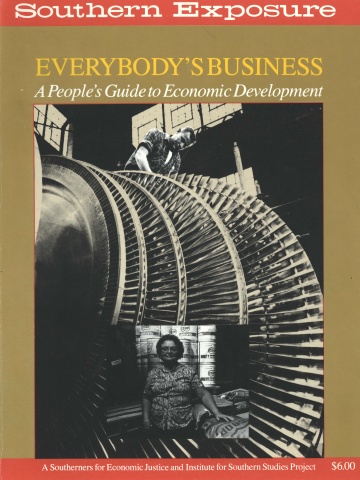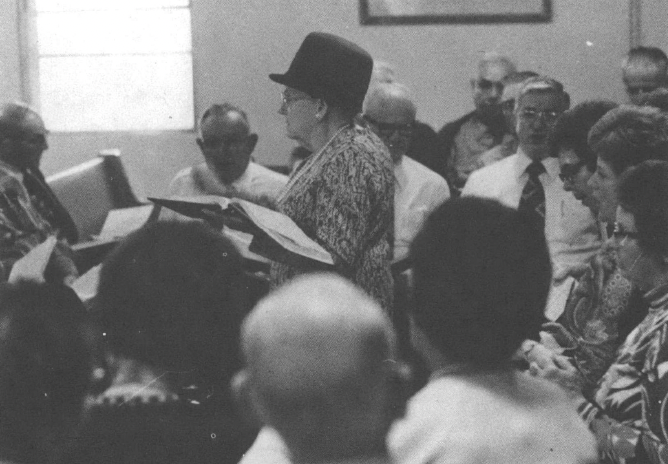
This article originally appeared in Southern Exposure Vol. 14 No. 5/6, "Everybody's Business." Find more from that issue here.
Most financial decision making is a matter of who trusts whom. Anyone who has read the account of the Penn Square Bank debacle in Oklahoma's oil patch knows that supposedly conservative bankers can trust some pretty strange people.
Too often the financial world is ready to listen to someone who arrives in a Lear jet and Gucci shoes and reject with equal quickness someone it perceives as being from "the wrong side of the tracks." It is rare to find a banker who will roll up his or her sleeves and wade in to sort out the financial wheat from the chaff in a neighborhood where blue collars outnumber white.
With public opinion swinging back toward "blame the victim" (being against racism and classism is "out"), the problem of trust has become more acute for low-income people. Do you trust this person with a job? Do you trust that one with a bank loan? Do you trust this community organization to develop a community-owned grocery store? This climate makes it increasingly difficult for people who control resources to perceive low-income men and women as worthy of trust.
Religious organizations can do something about this unhappy trend. No, they can't shovel money out the door as fast as the federal government used to. But that isn't what's needed, anyway. Far from needing bigger and more elaborate patron/client relationships, we need people ready to find and form genuine partnerships.
The search for partners should begin where it is easiest: among those who share bonds of a common faith. Religious fellowship brings people together who are separated by practically everything else in their lives. But even with a common bond of religion, finding partners for development requires major expenditures of energy. Our communities are full of barriers, whether in small towns or in large cities where urban-suburban geography seals off the life of the inner city from the lawn-and-barbecue set.
Churches and synagogues — local congregations — can bring a much needed sensitivity to community development. Significantly, I use the term "congregation" rather than a more general term such as "organized religion." National churches are fond of creating a program priority, such as minority economic development, and then setting up a new bureaucracy to implement the priority. This is a convenient way of excusing the local church from responsibility.
Within congregations is where most of religious life happens. It is there that the expertise and resources of the laity are stored. It is within congregations that power resides to transform communities. Regional church structures are necessities, but they always create the danger of taking away the debate about mission from the people who occupy the pews.
Community development corporations would do well to re-examine their relationships to congregations in their areas. Community and economic development leaders must ask hard questions about why they don't have more active support from religious groups.
Resources of time and money may be hidden beneath the surface of a low-profile congregation. That tiny Methodist chapel down the street could apply for a national Board of Global Ministries development grant; or that Baptist church whose only neighborhood impact is a Sunday morning traffic jam could very well get involved in organizing a community development credit union with deposits from national church agencies.
Most congregations have become accustomed to providing social services. Emergency food distribution, child care, and senior clubs are fixtures in urban churches. Many service programs receive funding from congregations in more affluent areas. But without bonds of trust, relationships between affluent and poor communities remain at the level of charity. Now is the time for clergy and lay leaders to be challenged to begin trusting the community they service to develop itself.
Specifically, religious congregations can play four important roles in support of community economic development:
Community Catalyst. A local congregation or a collection of churches and synagogues can trigger community organizing campaigns through bringing together community leaders and professional organizers.
Bridge Between Communities. Congregations can utilize their relationships with other faith communities to bring together neighborhood leaders and people with financial and intellectual resources from outside the neighborhood.
Benevolent Investor. Religious organizations can utilize both cash flow and reserves to benefit the community. Small congregations without financial reserves can help organize a community development credit union and apply for loans from national agencies. Churches and synagogues with greater resources can invest directly in projects. In pursuit of democratic development goals, religious groups should be prepared to accept a higher risk and lower return than conventional investors.
Source of Volunteers. Religious organizations are a prime source of volunteers to fill community leadership roles. They also are an important source of professionals, attorneys, accountants, and planners who can donate services to projects and organizations.
Individual projects, though, will have only the tiniest impact unless they become the foundations of a movement. Perhaps that term is a key; we have relied for too long on bureaucratic initiatives from national churches, despite the fact that the transformation of low-income communities can come only from a grassroots movement within religious networks.
"Movement" implies a groundswell of activity which comes from the ranks of those who fill pews, attend seminaries, and occupy pulpits, large and small. It means people from different areas staying in touch, borrowing models, and building cooperative strategies to open more channels for social investments by national and regional religious bodies.
Tags
Louis L. Knowles
Louis L. Knowles is director of the Religious Philanthropy Program of the Council on Foundations in Washington, D.C. This article originally appeared in a special church issue of the newsletter Resources for Community-Based Economic Development (August/September 1986), available from the National Congress for Community Economic Development. (1986)

